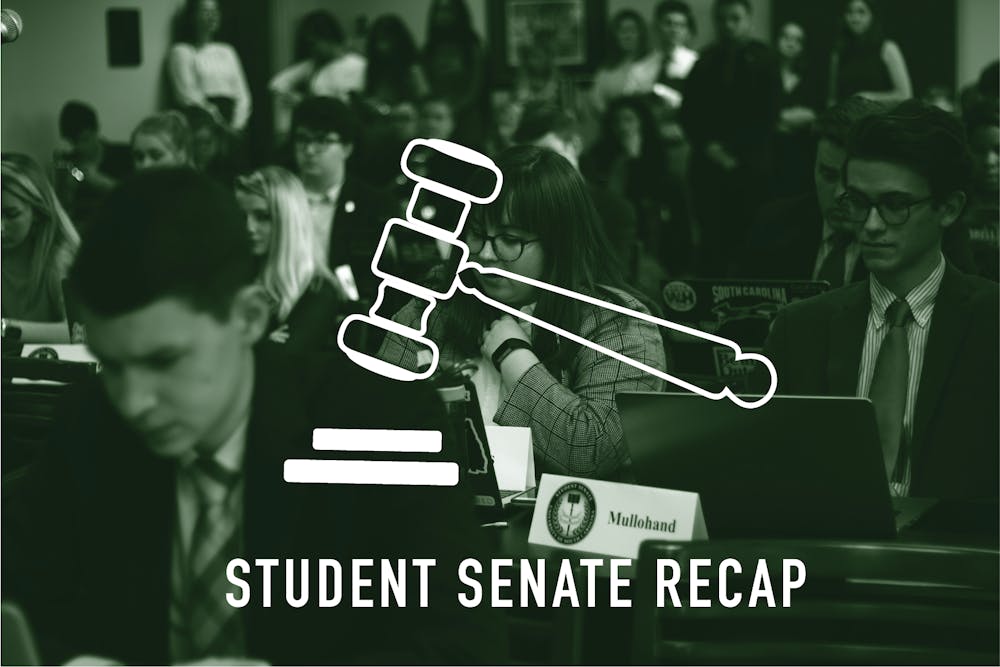A resolution to remove an on-campus memorial for Confederate general Robert E. Lee faced contention before passing in Wednesday’s student senate meeting.
The resolution’s sponsor, first-year criminology student Noah Glasgow, advocated fiercely for the memorial’s removal.
“It is not only appropriate, but it is necessary, especially in this time, and the environment we live in, we legislate in the defense of Black lives constantly,” Glasgow said.
The memorial is located in front of the McKissick Museum. It was donated by the Daughters of the Confederacy in 1954, the same year of the Brown v. Board of Education decision.
Although the resolution passed, five senators voted against it. While they made it clear that they were in moral opposition to Lee and his acts, their consensus was that judging historical figures by today’s morals is dangerous.
“You already have seen that they're attacking, you know, George Washington monuments. They're gonna come for all the Founding Fathers because they owned slaves, despite the fact that they did all these great things,” Matt Harris, a second-year engineering student, said.
Earlier, Glasgow had said he was in favor of removing statues of Washington, as well as those of “any person who has enslaved another human being.”
The opposition group also stated that removing a monument was not a “tangible” means of creating change on-campus.
“One of the ways we can [create a more diverse campus] just from where we are at right now, I think, is getting more diverse representation in Student Government itself, especially in senate,” John Hladin, a second-year international business and accounting student, said.
In addition to Harris and Hladin, senators Morgan McDonald, Dylan Peddimors and Madelyn Moosbrugger voted against the resolution.
An additional argument for the memorial’s removal, Glasgow said, is the fact that Lee engaged in treason against the United States as a member of the Confederacy.
“I feel like if you’re not able to hold office, you definitely should not be memorialized,” Glasgow said.
The senate also discussed a new resolution calling for a standardized, 10-point grading scale at USC. The resolution’s sponsor, second-year political science student Edward Morris, said that an inconsistent grading system creates issues when students are choosing classes.
“Right now, students have no way of knowing what the professor's grading scale will be before they enroll in a class,” Morris said. “And by establishing a standard grading scale, I feel students will have less anxiety and stress when registering for classes.”
Morris said the current grading system has gaps between letter grades, which are often based on the rigor of a class.
“That is just something we have to take at face value and off of their word, which, I have no doubt that the professors do do that,” Morris said. “There is an opportunity for some form of lie to come up there and I would rather have it set in stone.”
In last week's student senate meeting, first-year mass communications student Andrew Phillips introduced a resolution to ban the use of Zoom for university use.
This resolution was amended Wednesday to focus less on student usage of Zoom.
“For clubs and other meeting spaces, I understand that Zoom is a convenient way to meet, and it's their prerogative to take a risk,” Phillips said.
Still, the resolution was met with concerns over its possible overstep into the discretion of individual users for stating that university employees be barred from using the service.
First-year speech-language pathology student Anna Kelly spoke on her personal concerns regarding the amendment.
“If there are security issues with Zoom, people should be made aware of this,” Kelly said. “We can bring awareness to this issue but it should of course be up to the discretion of the user.”
The resolution failed by a 32-4 majority.

